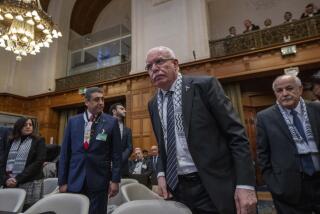Jerusalem or Israel? U.S. passport case is a constitutional tangle
The Supreme Court this week will take up the case of a 9-year-old boy born in Jerusalem to American parents who want their child’s passport to say his birthplace is in Israel.
The State Department refused their request in keeping with long-standing American foreign policy against recognizing Israeli sovereignty over Jerusalem.
This seemingly narrow dispute over one word on a passport has put before the high court several broad questions that have long divided diplomats and constitutional scholars. Does the president have the “exclusive” power to recognize foreign governments and speak for the United States, or does Congress have a voice as well?
And can the president essentially void an act of Congress by issuing a “signing statement” in which he refuses to enforce part of a law?
Menachem Binyamin Zivotofsky was born in a Jerusalem hospital on Oct. 17, 2002, and his American parents, Ari and Naomi, went to the U.S. Consulate asking to have his birthplace listed as “Jerusalem, Israel.” The consulate listed it as “Jerusalem.” Had their son been born in Tel Aviv, the parents could have had Israel listed as his birthplace.
The U.S. policy of strict neutrality toward Jerusalem has long rankled many in Congress. During the 1980s and 1990s, Congress tried to force Presidents Reagan and Clinton to relocate the U.S. Embassy from Tel Aviv to Jerusalem, but they refused.
In September 2002, a month before Menachem’s birth, Congress passed another bill urging President George W. Bush to relocate the embassy to Jerusalem. A second provision said “for purposes of the registration of birth … or issuance of a passport of a United States citizen born in the city of Jerusalem, the secretary of State shall, upon request … record the place of birth as Israel.”
Bush signed the bill into law but added a statement saying he would not abide by the provision on passports. It would “impermissibly interfere with the president’s constitutional authority to … speak for the nation in international affairs and determine the terms on which recognition is giving to foreign states,” the president said.
Throughout his term, Bush issued hundreds of “signing statements” when he signed bills into law, as did his predecessors, most often declaring that he would not enforce a provision because it conflicted with his powers as president, legal experts said.
On Monday, lawyers for President Obama and Secretary of State Hillary Rodham Clinton will go before the high court to defend Bush’s view in the passport case. The president has “the exclusive power to recognize foreign sovereigns and … to determine the content of passports,” Solicitor Gen. Donald Verrilli Jr. said.
Not so, counters Washington attorney Nathan Lewin on behalf of the parents. He contends that Congress passed a valid law giving the Zivotofkys a right to have Israel listed as their son’s birthplace. “The president may not effectively veto a law with a signing statement,” Lewin said.
The case also confronts the court with a constitutional question about its own power. When the parents sued, a federal judge in Washington and the U.S. Court of Appeals dismissed their claim on the grounds that it turned on a “political question.” The lower-court judges decided that the dispute over the status of Jerusalem must be resolved by Congress and the president, not by a court.
Lewin objected on this issue as well. When “the rights of individual citizens” are at stake, it is “the court’s duty to determine the lawfulness of the government conduct,” he said in his appeal to the Supreme Court.
The case to be heard Monday is called Zivotofsky vs. Clinton.
More to Read
Start your day right
Sign up for Essential California for news, features and recommendations from the L.A. Times and beyond in your inbox six days a week.
You may occasionally receive promotional content from the Los Angeles Times.







